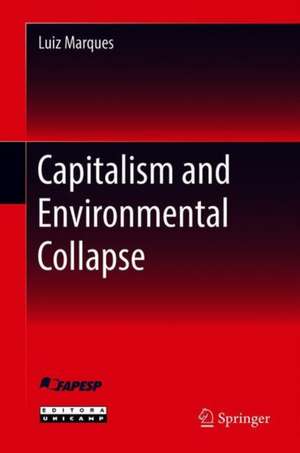Capitalism and Environmental Collapse
Autor Luiz Marquesen Limba Engleză Hardback – 18 aug 2020
- Earth energy imbalance, climate change and global warming
- Sea-level rise
- Decrease and degradation of forests
- Collapse of terrestrial and aquatic biodiversity
- Floods, droughts, wildfires, and extreme weather events
- Degradation of soils and water resources
- Increase in pollution caused by fossil fuels and coal
- Increase in waste production and industrial intoxication
Finally, Marques argues that "fitting" back into the biosphere will only be possible if we dismantle the expansive socioeconomic gear that has shaped our societies since the 16th century by moving from a Social Contract to a Natural Contract, which takes into account the whole biosphere. According to him, the future society will be post-capitalist or it will not be a complex society, and even perhaps, we must fear, no society at all.
“This book is backed up with the latest and best science and has made the complexities understandable for the average reader, all in a context of hope for the future.” - William J. Ripple, PhD, Distinguished Professor of Ecology, Director of the Alliance of World Scientists, Oregon State University
| Toate formatele și edițiile | Preț | Express |
|---|---|---|
| Paperback (1) | 649.39 lei 43-57 zile | |
| Springer International Publishing – 18 aug 2021 | 649.39 lei 43-57 zile | |
| Hardback (1) | 655.78 lei 43-57 zile | |
| Springer International Publishing – 18 aug 2020 | 655.78 lei 43-57 zile |
Preț: 655.78 lei
Preț vechi: 771.50 lei
-15% Nou
Puncte Express: 984
Preț estimativ în valută:
125.48€ • 131.37$ • 103.83£
125.48€ • 131.37$ • 103.83£
Carte tipărită la comandă
Livrare economică 07-21 aprilie
Preluare comenzi: 021 569.72.76
Specificații
ISBN-13: 9783030475260
ISBN-10: 3030475263
Pagini: 459
Ilustrații: XX, 459 p. 48 illus.
Dimensiuni: 155 x 235 mm
Greutate: 0.84 kg
Ediția:1st ed. 2020
Editura: Springer International Publishing
Colecția Springer
Locul publicării:Cham, Switzerland
ISBN-10: 3030475263
Pagini: 459
Ilustrații: XX, 459 p. 48 illus.
Dimensiuni: 155 x 235 mm
Greutate: 0.84 kg
Ediția:1st ed. 2020
Editura: Springer International Publishing
Colecția Springer
Locul publicării:Cham, Switzerland
Cuprins
Part I: The Convergence of Environmental Crises.- 1. Introduction.- 2. Decrease and Degradation of Forests.- 3. Water and Soil.- 4. Waste and Industrial Intoxication.- 5. Fossil fuels.- 6. The Regression to Coal.- 7. Climate emergency.- 8. Climate Feedbacks and Tipping Points.- 9. Demography and Democracy.- 10. Collapse of Terrestrial Biodiversity.- 11. Collapse of Biodiversity in the Aquatic Environment.- 12. Genesis of the Idea of the Anthropocene and the New Man–Nature Relationship.- Part II: Three Concentric Illusions.- 13. The Illusion of a Sustainable Capitalism.- 14. More Surplus = Less Security.- 15. The Anthropocentric Illusion.- 16. Conclusion: From the Social Contract to the Natural Contract.
Notă biografică
Luiz Marques is associate professor at the Department of History, University of Campinas (Unicamp), Brazil. He has published several books and essays on the Classical Tradition and, more recently, has dedicated his studies to investigate the growing anthropogenic degradation of ecosystems. Originally published in Portuguese, Capitalism and Environmental Collapse summarizes Prof. Marques’ findings and reflections on this subject.
Textul de pe ultima copertă
This book intends to be an alert to the fact that the curve measuring environmental costs against the economic benefits of capitalism has irreversibly entered into a negative phase. The prospect of an environmental collapse has been evidenced by the sciences and the humanities since the 1960s. Today, it imposes its urgency. This collapse differs from past civilizations in that it is neither local nor just civilizational. It is global and occurs at the broadest level of the biosphere, accelerated by the convergence of different socio-environmental crises, such as:
Finally, Marques argues that "fitting" back into the biosphere will only be possible if we dismantle the expansive socioeconomic gear that has shaped our societies since the 16th century by moving from a Social Contract to a Natural Contract, which takes into account the whole biosphere. According to him, the future society will be post-capitalist or itwill not be a complex society, and even perhaps, we must fear, no society at all.
- Earth energy imbalance, climate change and global warming
- Sea-level rise
- Decrease and degradation of forests
- Collapse of terrestrial and aquatic biodiversity
- Floods, droughts, wildfires, and extreme weather events
- Degradation of soils and water resources
- Increase in pollution caused by fossil fuels and coal
- Increase in wasteproduction and industrial intoxication
Finally, Marques argues that "fitting" back into the biosphere will only be possible if we dismantle the expansive socioeconomic gear that has shaped our societies since the 16th century by moving from a Social Contract to a Natural Contract, which takes into account the whole biosphere. According to him, the future society will be post-capitalist or itwill not be a complex society, and even perhaps, we must fear, no society at all.
Caracteristici
Presents a comprehensive review of data that shows how different environmental crises are converging to a global environmental collapse Provides an interdisciplinary framework to interpret the current environmental crises building upon different branches of the social sciences Analyzes the current global environmental crises from the point of view of political economy and global and environmental history
